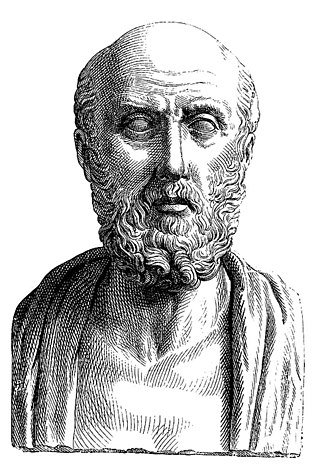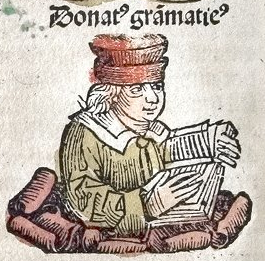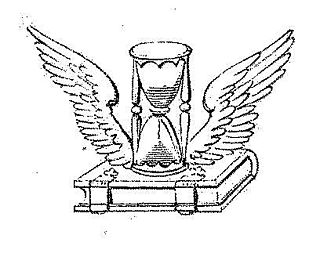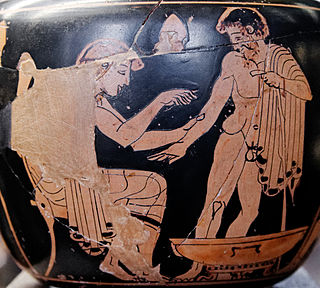
An epigram is a brief, interesting, memorable, sometimes surprising or satirical statement. The word derives from the Greek ἐπίγραμμα. This literary device has been practiced for over two millennia.

Hippocrates of Kos, also known as Hippocrates II, was a Greek physician of the classical period who is considered one of the most outstanding figures in the history of medicine. He is traditionally referred to as the "Father of Medicine" in recognition of his lasting contributions to the field, such as the use of prognosis and clinical observation, the systematic categorization of diseases, and the formulation of humoral theory. The Hippocratic school of medicine revolutionized ancient Greek medicine, establishing it as a discipline distinct from other fields with which it had traditionally been associated, thus establishing medicine as a profession.

The Hippocratic Oath is an oath of ethics historically taken by physicians. It is one of the most widely known of Greek medical texts. In its original form, it requires a new physician to swear, by a number of healing gods, to uphold specific ethical standards. The oath is the earliest expression of medical ethics in the Western world, establishing several principles of medical ethics which remain of paramount significance today. These include the principles of medical confidentiality and non-maleficence. As the seminal articulation of certain principles that continue to guide and inform medical practice, the ancient text is of more than historic and symbolic value. It is enshrined in the legal statutes of various jurisdictions, such that violations of the oath may carry criminal or other liability beyond the oath's symbolic nature.
An aphorism is a concise, terse, laconic, or memorable expression of a general truth or principle. Aphorisms are often handed down by tradition from generation to generation.

Algorism is the technique of performing basic arithmetic by writing numbers in place value form and applying a set of memorized rules and facts to the digits. One who practices algorism is known as an algorist. This positional notation system has largely superseded earlier calculation systems that used a different set of symbols for each numerical magnitude, such as Roman numerals, and in some cases required a device such as an abacus.

The Hippocratic Corpus, or Hippocratic Collection, is a collection of around 60 early Ancient Greek medical works strongly associated with the physician Hippocrates and his teachings. The Hippocratic Corpus covers many diverse aspects of medicine, from Hippocrates' medical theories to what he devised to be ethical means of medical practice, to addressing various illnesses. Even though it is considered a singular corpus that represents Hippocratic medicine, they vary in content, age, style, methods, and views practiced; therefore, authorship is largely unknown. Hippocrates began Western society's development of medicine, through a delicate blending of the art of healing and scientific observations. What Hippocrates was sharing from within his collection of works was not only how to identify symptoms of disease and proper diagnostic practices, but more essentially, he was alluding to his personable form of art, "The art of true living and the art of fine medicine combined." The Hippocratic Corpus became the foundation upon which Western medical practice was built.

Aelius Donatus was a Roman grammarian and teacher of rhetoric.

"De Brevitate Vitae", more commonly known as "Gaudeamus igitur" or just "Gaudeamus", is a popular academic commercium song in many European countries, mainly sung or performed at university graduation ceremonies. Despite its use as a formal graduation hymn, it is a jocular, light-hearted composition that pokes fun at university life. The song is thought to originate in a Latin manuscript from 1287. It is in the tradition of carpe diem with its exhortations to enjoy life. It was known as a beer-drinking song in many early universities and is the official song of many schools, colleges, universities, institutions, student societies and is the official anthem of the International University Sports Federation.

Mensural notation is the musical notation system used for polyphonic European vocal music from the late 13th century until the early 17th century. The term "mensural" refers to the ability of this system to describe precisely measured rhythmic durations in terms of numerical proportions between note values. Its modern name is inspired by the terminology of medieval theorists, who used terms like musica mensurata or cantus mensurabilis to refer to the rhythmically defined polyphonic music of their age, as opposed to musica plana or musica choralis, i.e., Gregorian plainchant. Mensural notation was employed principally for compositions in the tradition of vocal polyphony, whereas plainchant retained its own, older system of neume notation throughout the period. Besides these, some purely instrumental music could be written in various forms of instrument-specific tablature notation.

Tempus fugit is a Latin phrase, usually translated into English as "time flies". The expression comes from line 284 of book 3 of Virgil's Georgics, where it appears as fugitirreparabiletempus: "it escapes, irretrievable time". The phrase is used in both its Latin and English forms as a proverb that "time's a-wasting".

Ancient Greek medicine was a compilation of theories and practices that were constantly expanding through new ideologies and trials. The Greek term for medicine was iatrikē. Many components were considered in ancient Greek medicine, intertwining the spiritual with the physical. Specifically, the ancient Greeks believed health was affected by the humors, geographic location, social class, diet, trauma, beliefs, and mindset. Early on the ancient Greeks believed that illnesses were "divine punishments" and that healing was a "gift from the Gods". As trials continued wherein theories were tested against symptoms and results, the pure spiritual beliefs regarding "punishments" and "gifts" were replaced with a foundation based in the physical, i.e., cause and effect.
Brevis is the Latin word for short, and may refer to:

Ars Longa Vita Brevis is the second album by the English progressive rock group the Nice.

Soranus of Ephesus was a Greek physician. He was born in Ephesus but practiced in Alexandria and subsequently in Rome, and was one of the chief representatives of the Methodic school of medicine. Several of his writings still survive, most notably his four-volume treatise on gynecology, and a Latin translation of his On Acute and Chronic Diseases.

Vita Brevis: A Letter to St Augustine is a novel written by the Norwegian author Jostein Gaarder and originally published in 1996. Gaarder presents the text as written by Saint Augustine´s lover.
Gilbertus Anglicus was a medieval English physician. He is known chiefly for his encyclopedic work, the Compendium of Medicine, most probably written between 1230 and 1250. This medical treatise was an attempt at a comprehensive overview of the best practice in pharmacology, medicine, and surgery at the time. His medical works, alongside those of John of Gaddesden, "formed part of the core curriculum that underpinned the practice of medicine for the next 400 years".

The University of Sheffield Medical School is a medical school based at the University of Sheffield in Sheffield, South Yorkshire, England. The school traces its history back to at least 1828. It operated independently until its merger with Firth College and Sheffield Technical School in 1897, and is now an integral part of Sheffield's Faculty of Medicine, Dentistry and Health.
The Galenic corpus is the collection of writings of Galen, a prominent Greek physician, surgeon and philosopher in the Roman Empire during the second century CE. Several of the works were written between 165–175 CE.
Life's Too Short may refer to:

Armengaud Blaise was a physician, translator and author active in the Crown of Aragon and Papal Avignon. He mainly translated Arabic medical works into Latin, but he also made one translation from Hebrew with the help of a Jewish friend. Authors he translated include Galen, Avicenna and Maimonides. He wrote two original medical works in Latin, one of which was soon afterwards translated into Hebrew.
![Mural at the Old Town Hall (Gottingen) [de] in Germany. Altes Rathaus Gottingen 20110802-14.JPG](http://upload.wikimedia.org/wikipedia/commons/thumb/1/12/Altes_Rathaus_G%C3%B6ttingen_20110802-14.JPG/145px-Altes_Rathaus_G%C3%B6ttingen_20110802-14.JPG)












